It’s fascinating to see how companies continue to use email. The why they use email as a marketing tool is obvious: it’s cheap and effective. However, just because it’s so cheap, it’s appalling to see how many companies/brands wreck the opportunity with inconsiderate work. To their disadvantage, they hurt their own equity and credibility with impersonal communications or, even worse, spammy-me-me-me messages. Then there is just plain sloppy work with amateur mistakes — even in the email subject lines. There are probably many reasons why these mistakes continue to plague our inboxes. I would posit that most supervising managers are just not aware and/or don't have the knowledge Share on X (including empathy) to figure out how to do good email campaigns. Of course, there’s also the classic issue: I just don’t have the time to check…
Sloppy work
It’s always quite disturbing — if not outright shocking — when a company, that is 100%-vested in the Internet and whose business depends on email for so much of its revenues, can send out an email with a glaring hole/mistake in its email subject line. Internet Retailing sent this email out a few weeks ago with just “TBC” in the subject line. Clearly, the text had not been reviewed or confirmed… In any event, it was sent out as such. Moreover, in the realm of best practices, I would have to say that including a reply-to email that looks more like a spammer mail address is not good form. Finally, there is the greeting, “Dear Subscriber,” that is far from personalized… (To be fair, I don’t remember if I was ever asked for my name when I signed up; although maybe they should have tried harder to get it).
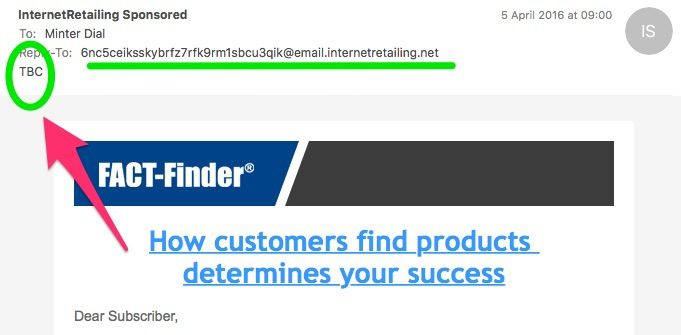
Another recent example, with the same reliance on emails for their business success, came from the organizers of the folks at Webit Foundation. It comes with an invitation — supposedly directly from the founder — to come “as my guest”… You’ll notice below that the greetings are somewhat impersonal. Somehow, you get the feeling that the personal code is not as worthy. Not to forget the fact that this was the sixth email I had received from this organization trying to get me to come.
 Email subject line personalization
Email subject line personalization
And then there is the next level of emailing: personalization. To ask for a personalized — without even hoping for personal — email from a large organization is quite unreasonable. The reasons that companies parade out as to why they don’t / can’t / won’t personalize the content of their emails are rather dreadful, per the recent eMarketer study below (in the US):
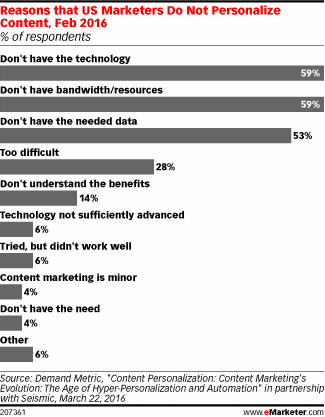
I would put it down to not having the desire and/or mindset. However, it is entirely conceivable to craft specific and adapted email subject lines in function of certain groupings of people. Gilt, the luxury flash sales site, has developed a best-in-class method of using demographics, behaviors and predictive modeling to come up with the most likely successful language in the title, much less in the content of the mail. N.B. Gilt sends out 2,000 different daily emails (including subject line, text, offers and images) to its 9 million members.
Faux personal
One of my personal pet peeves is the attempt to hide generic mass invitations with the following text:
“I’d like to personally invite you…”
This rather trendy conference organizer sent out the below mail to me recently… and yet, the click-through goes to a generic inscription sheet, with none of the lines pre-populated. Nothing to indicate that I was getting special treatment in my “personal invitation.” Not to mention that this was obviously not sent out personally by the individual in question.
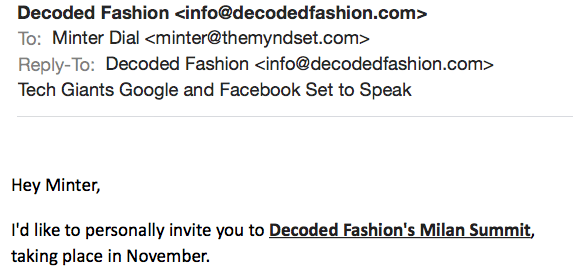
Personalization pays
And yet, personalization and adapted content clearly is considered more effective… as this 2015 survey by eMarketer showed.
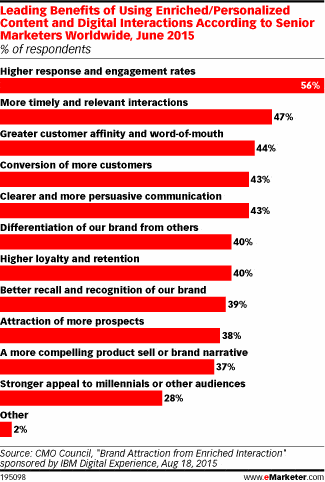
Brand voice
Finding the right tone for an email campaign starts with understanding your brand and your audience. Share on X Attempts that waver from your brand voice will undoubtedly tarnish your equity and, little by little, diminish your receiver’s desire to open/engage with your message. Screaming headlines, using trickery and/or making sloppy mistakes are not life threatening, but these actions speak to a blithe disregard of the receiver’s inbox and attention.
Personalization takes time and resources. It also takes the right mindset. At the very least, managers should be aware of what their teams are sending out and make sure that avoidable errors aren’t being made. For anyone looking for a great round-up of good emails, this article in Fast Company, is particularly useful.
Your thoughts and reactions are entirely welcome and, indeed, encouraged!

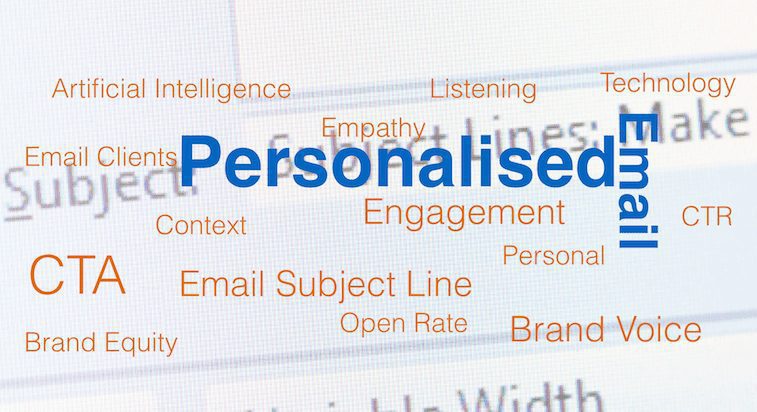
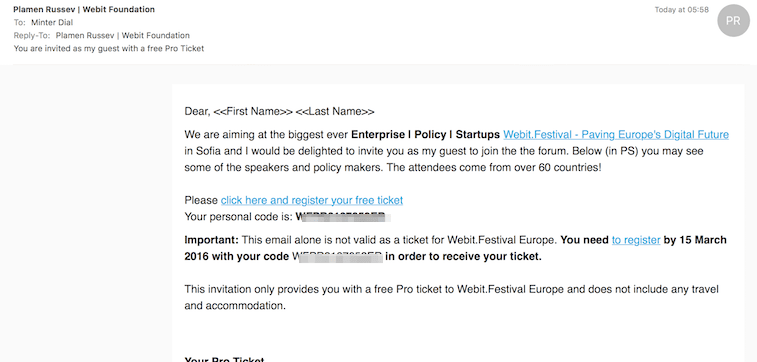 Email subject line personalization
Email subject line personalization









Email marketing is becoming harder and harder. Thanks for sharing these great ideas with us.